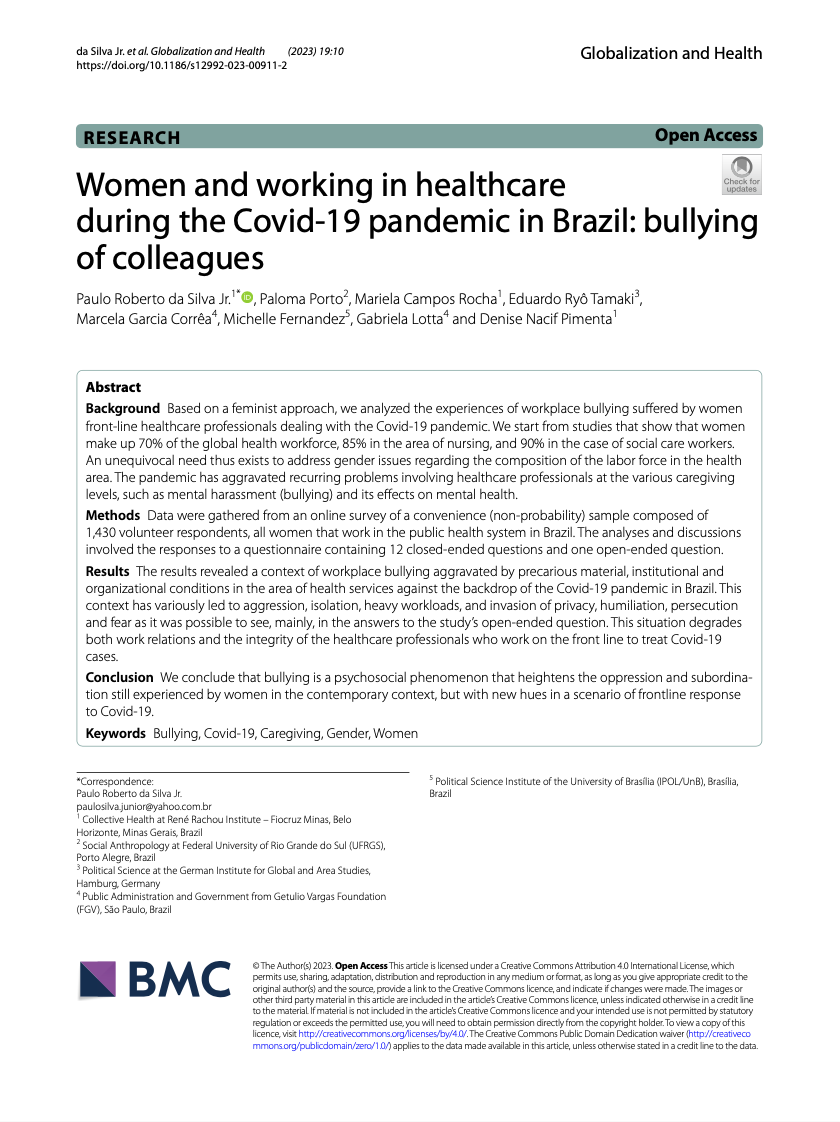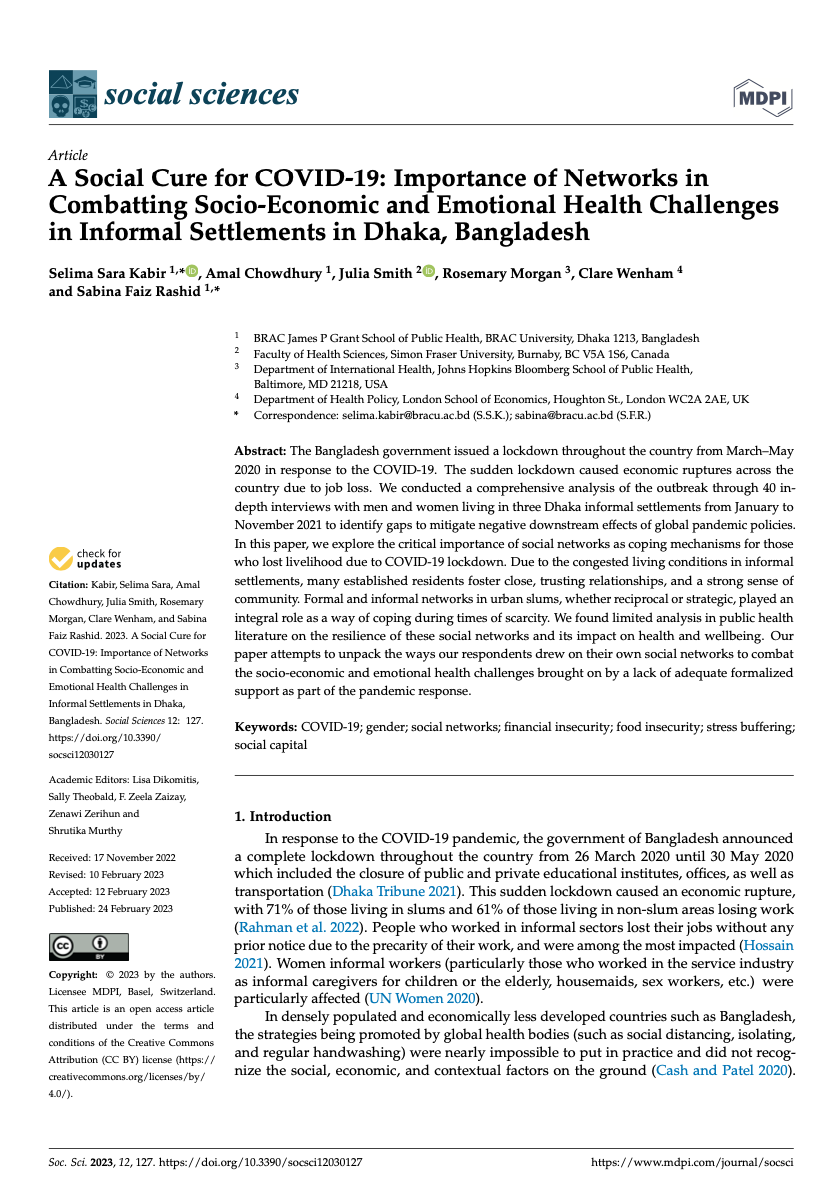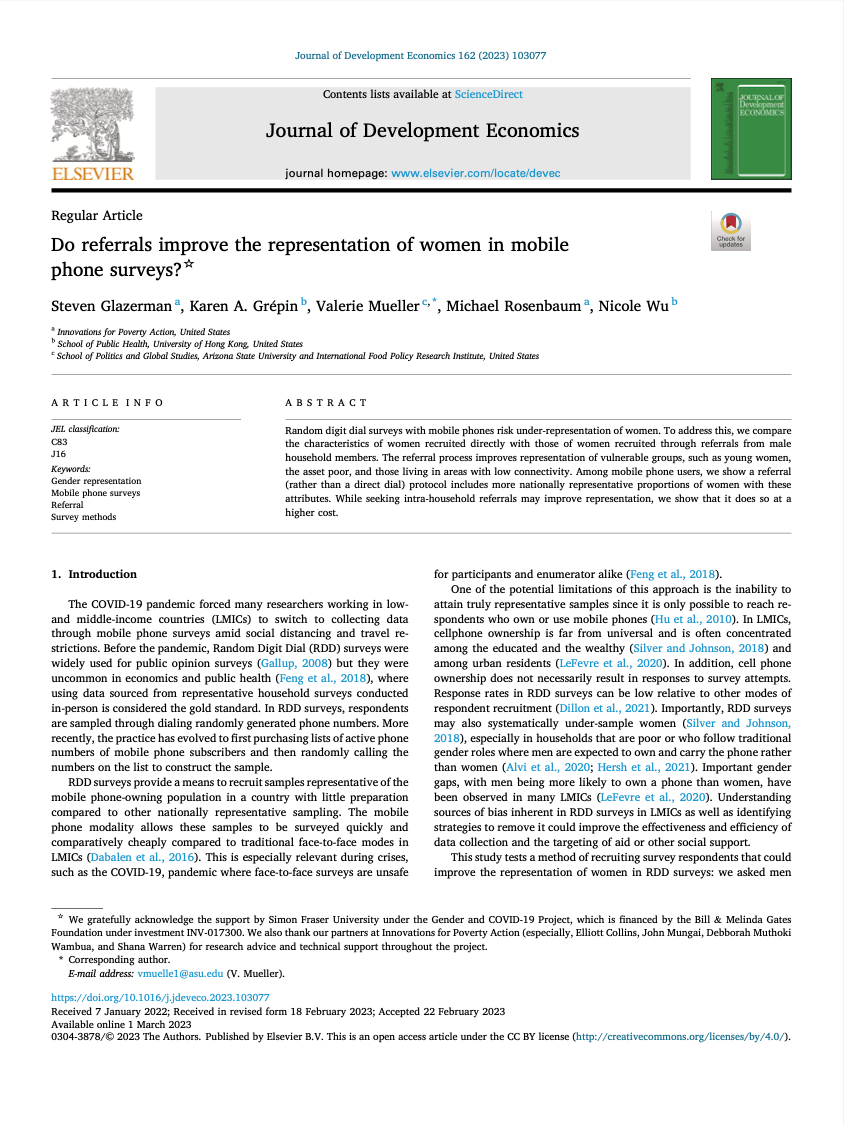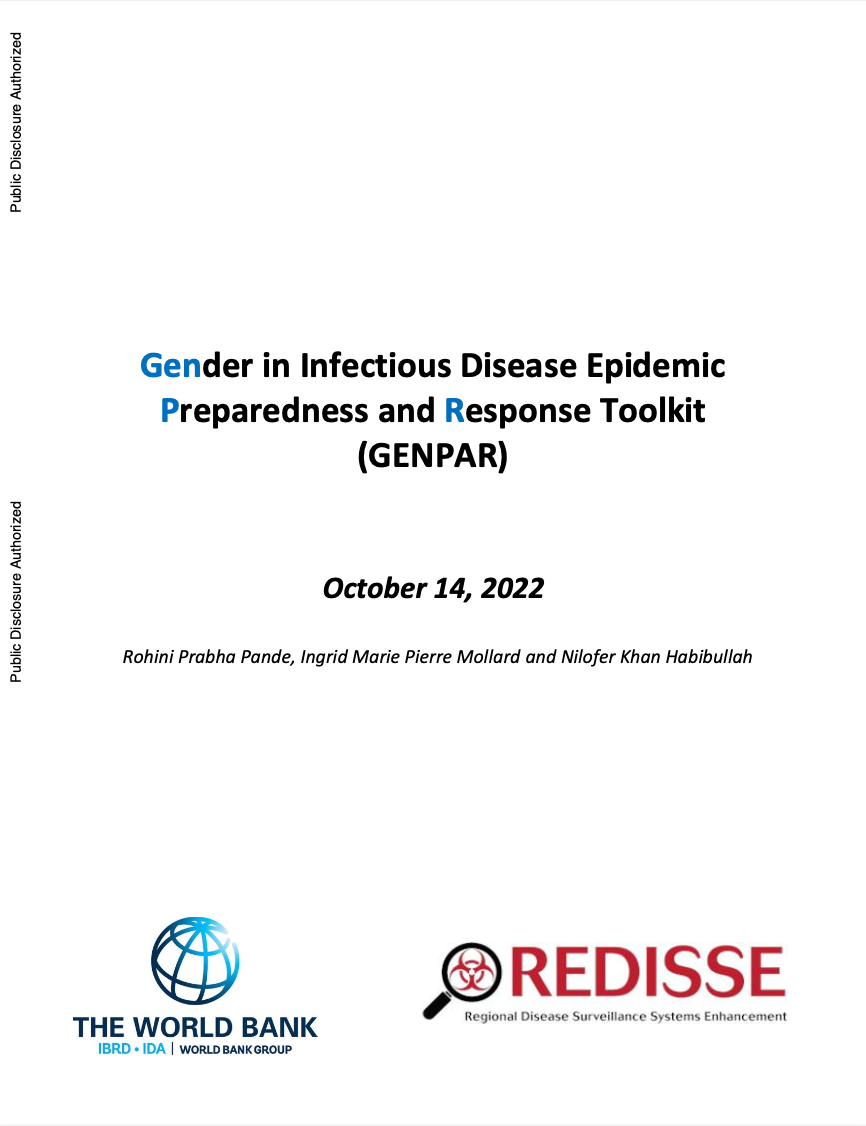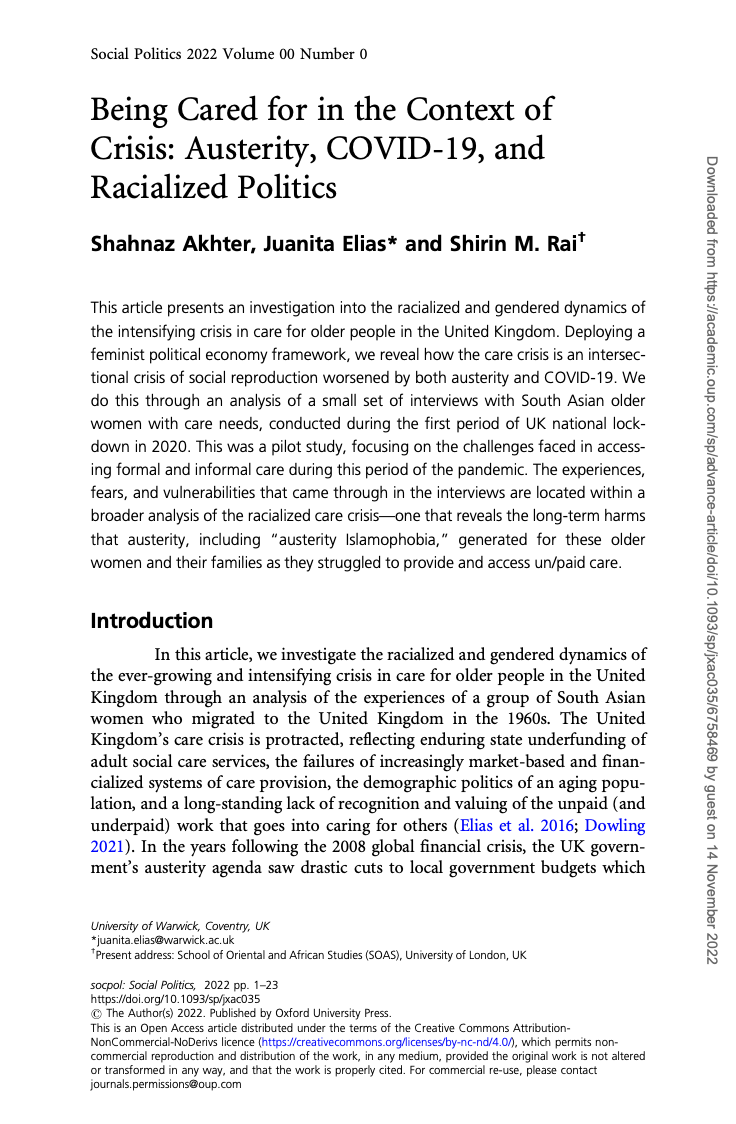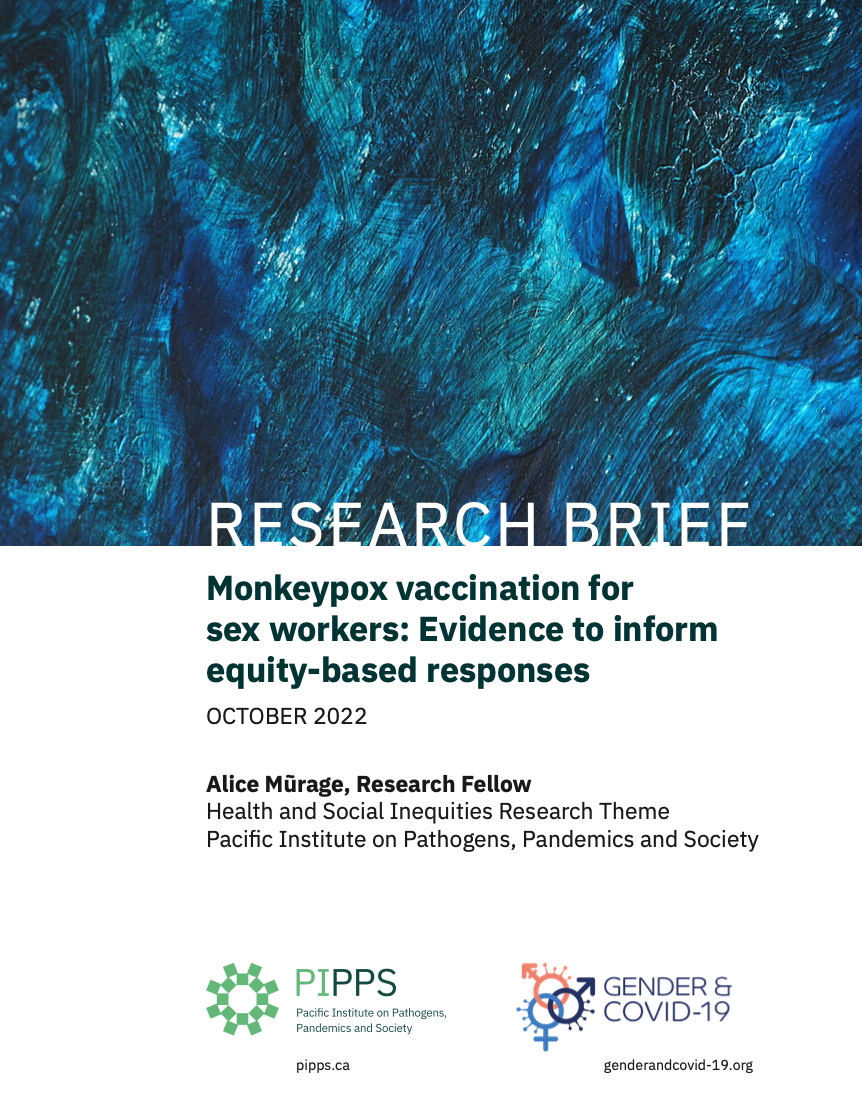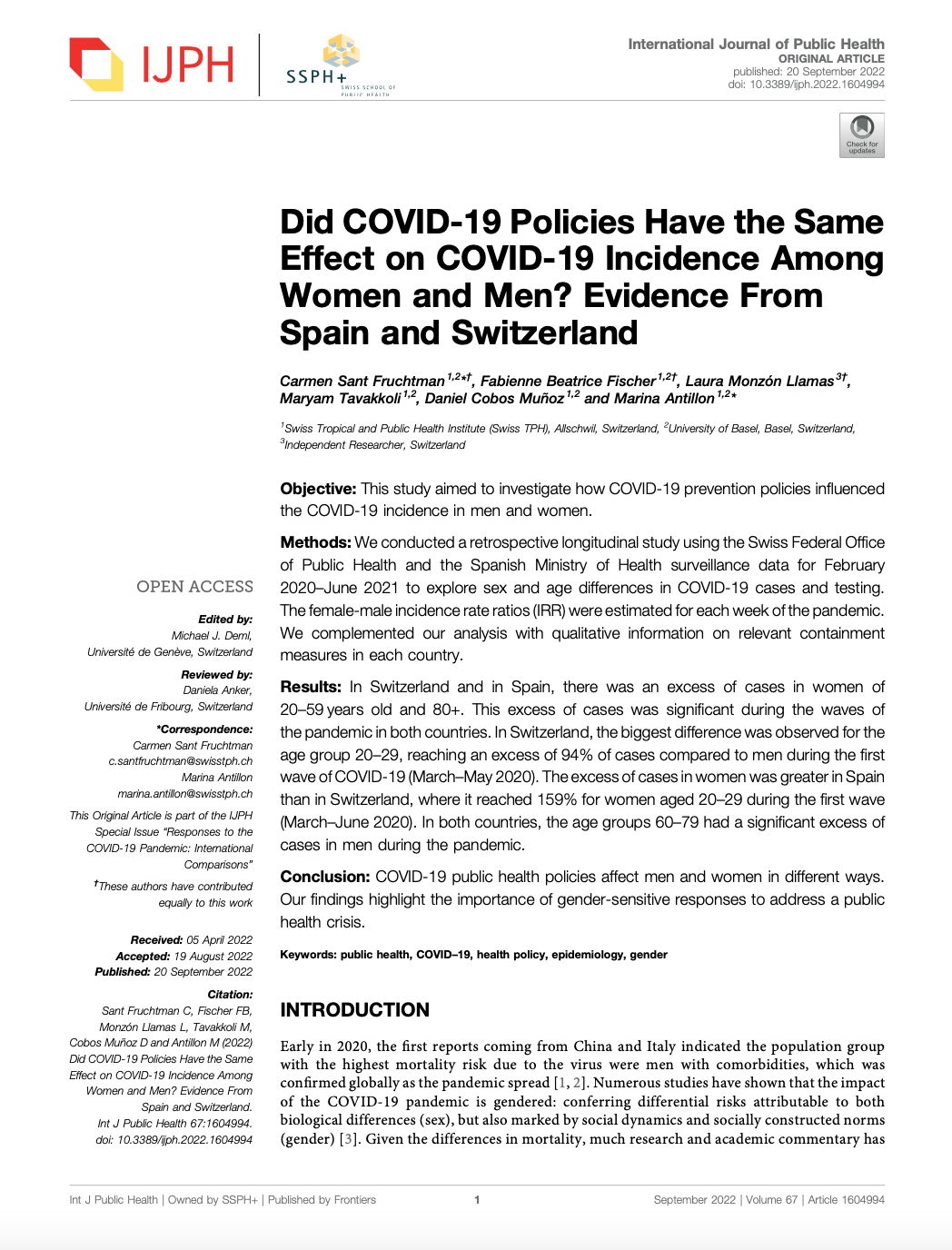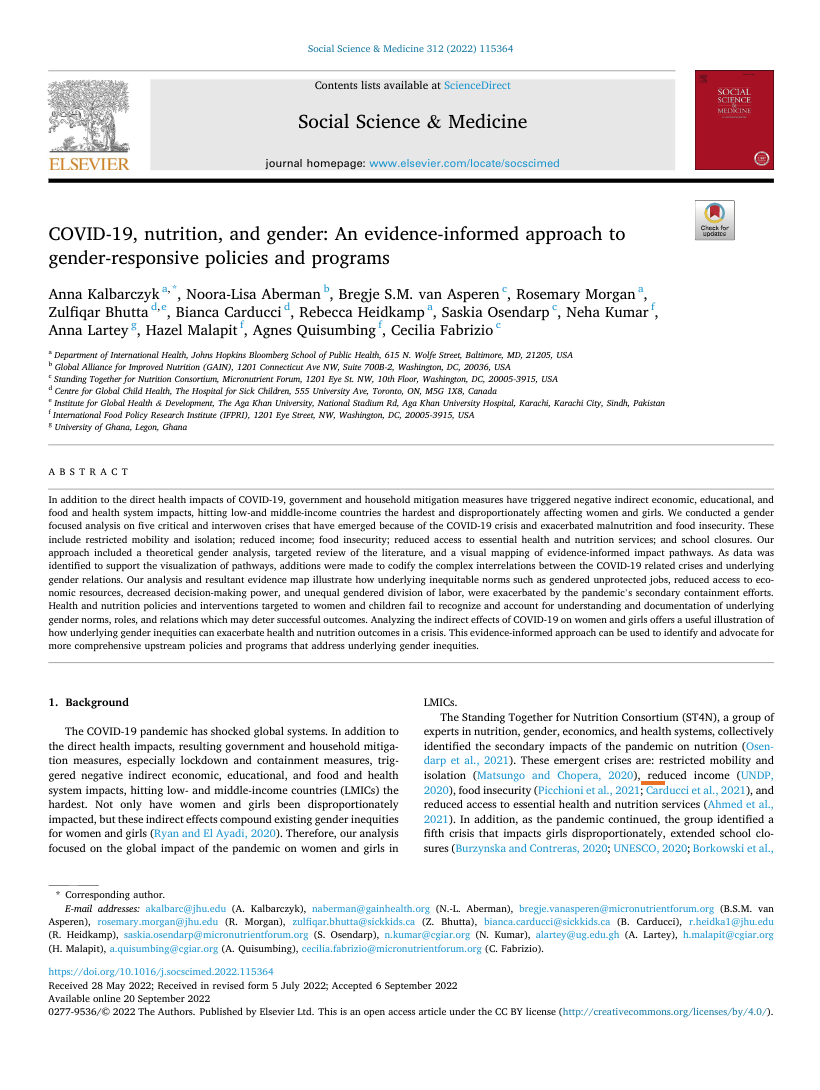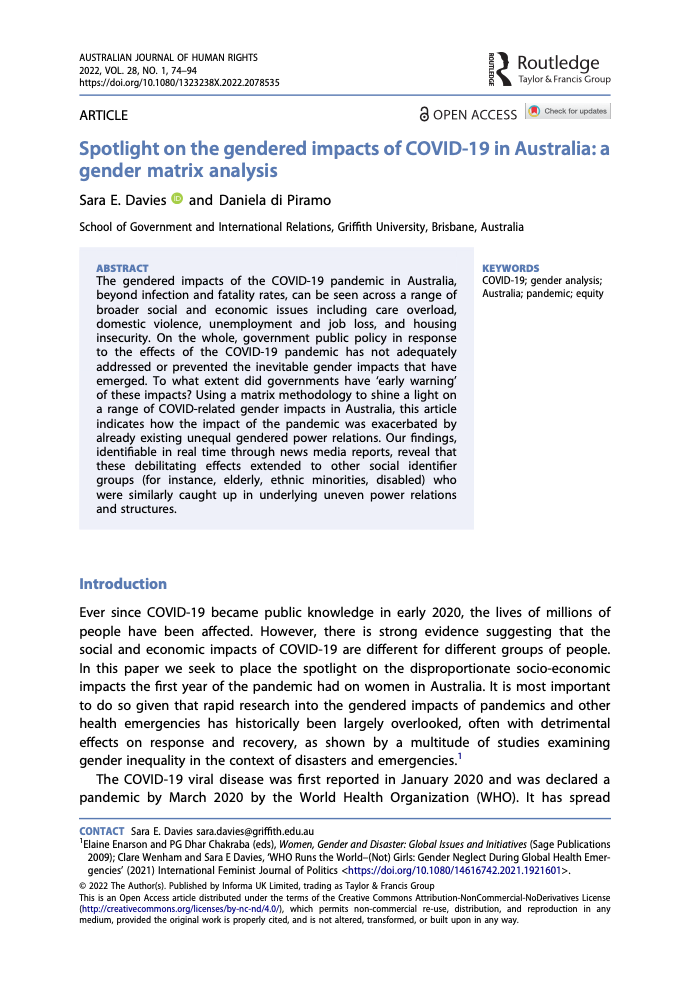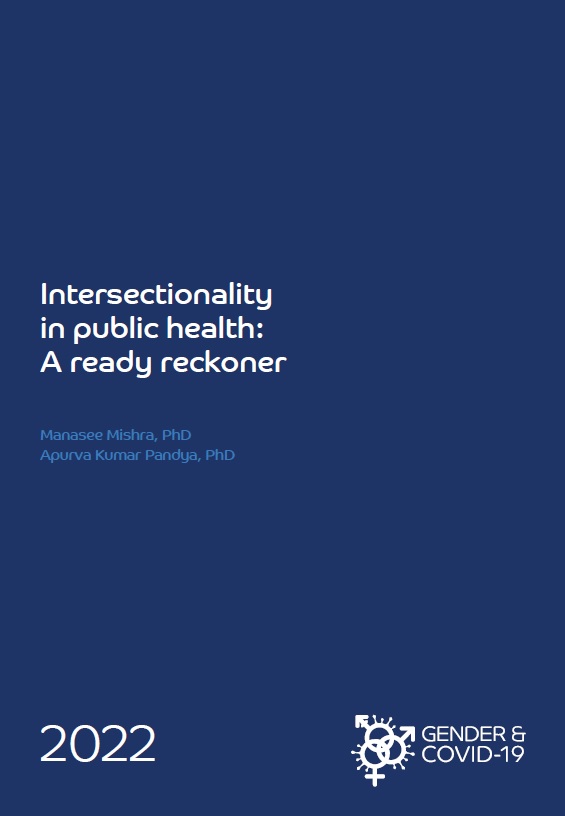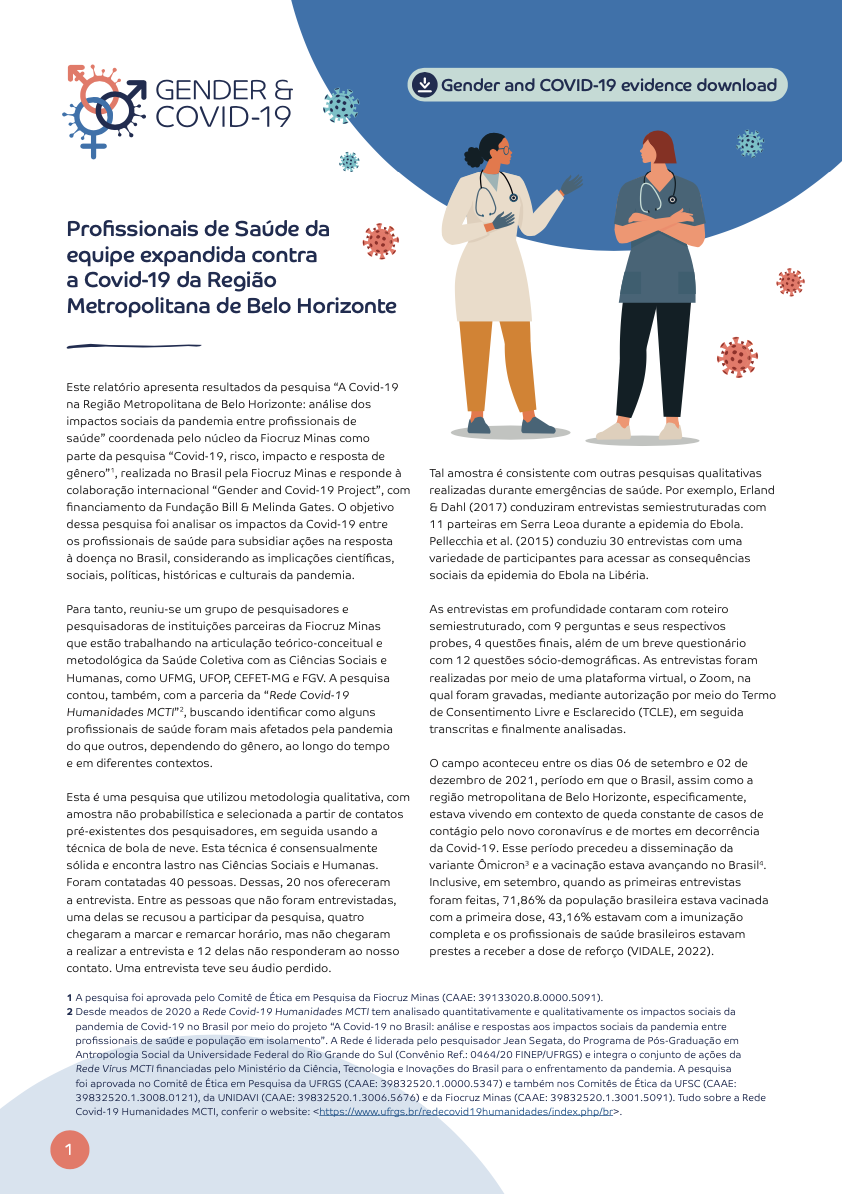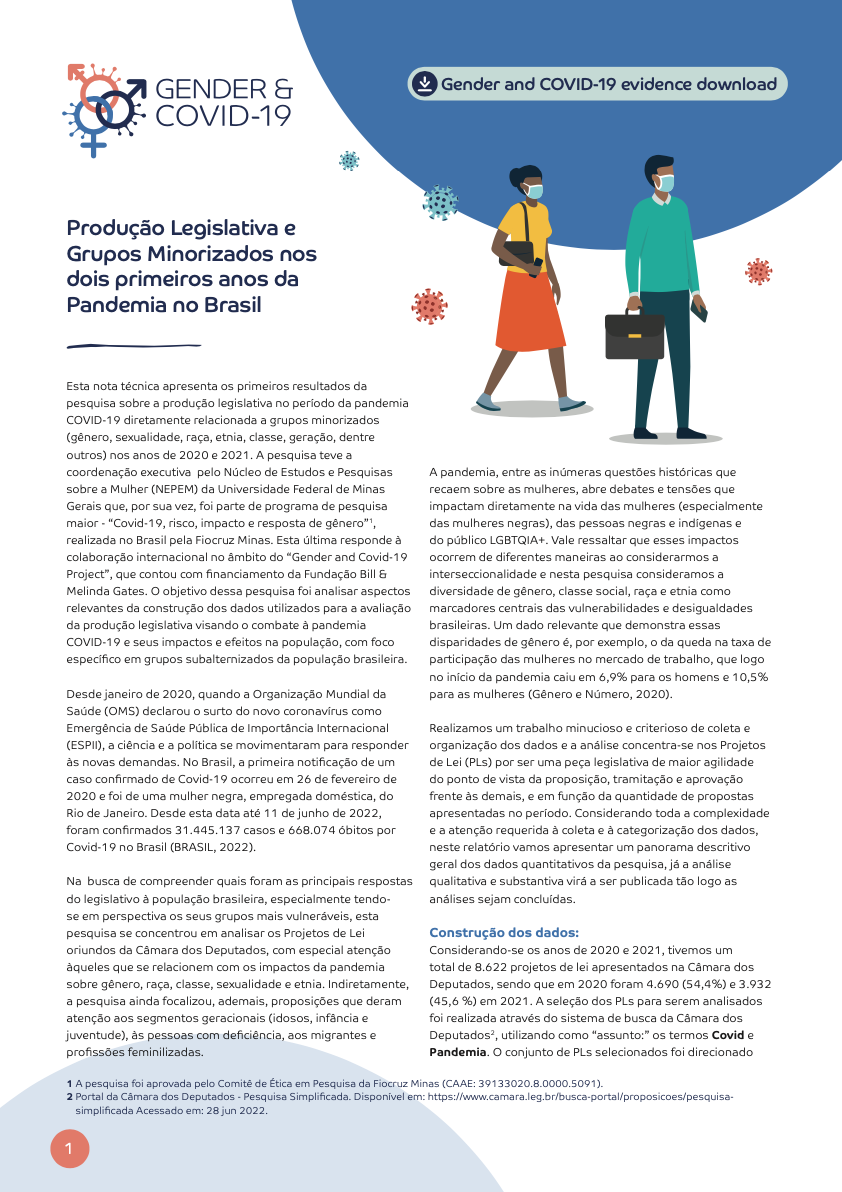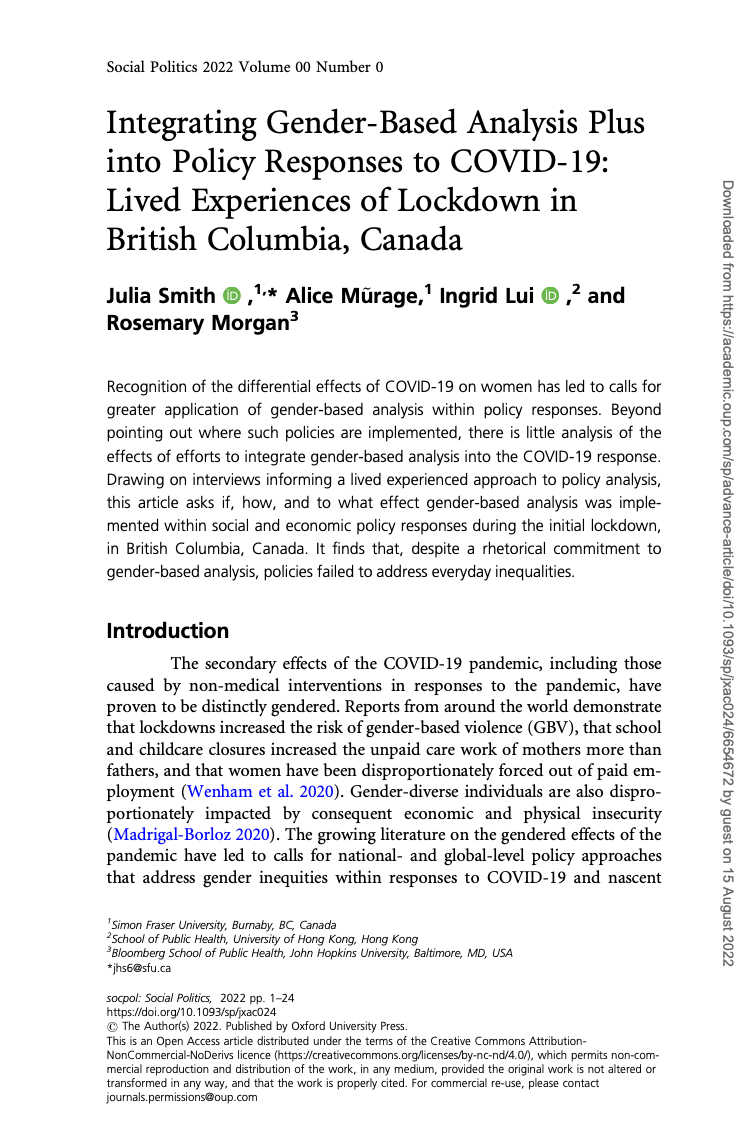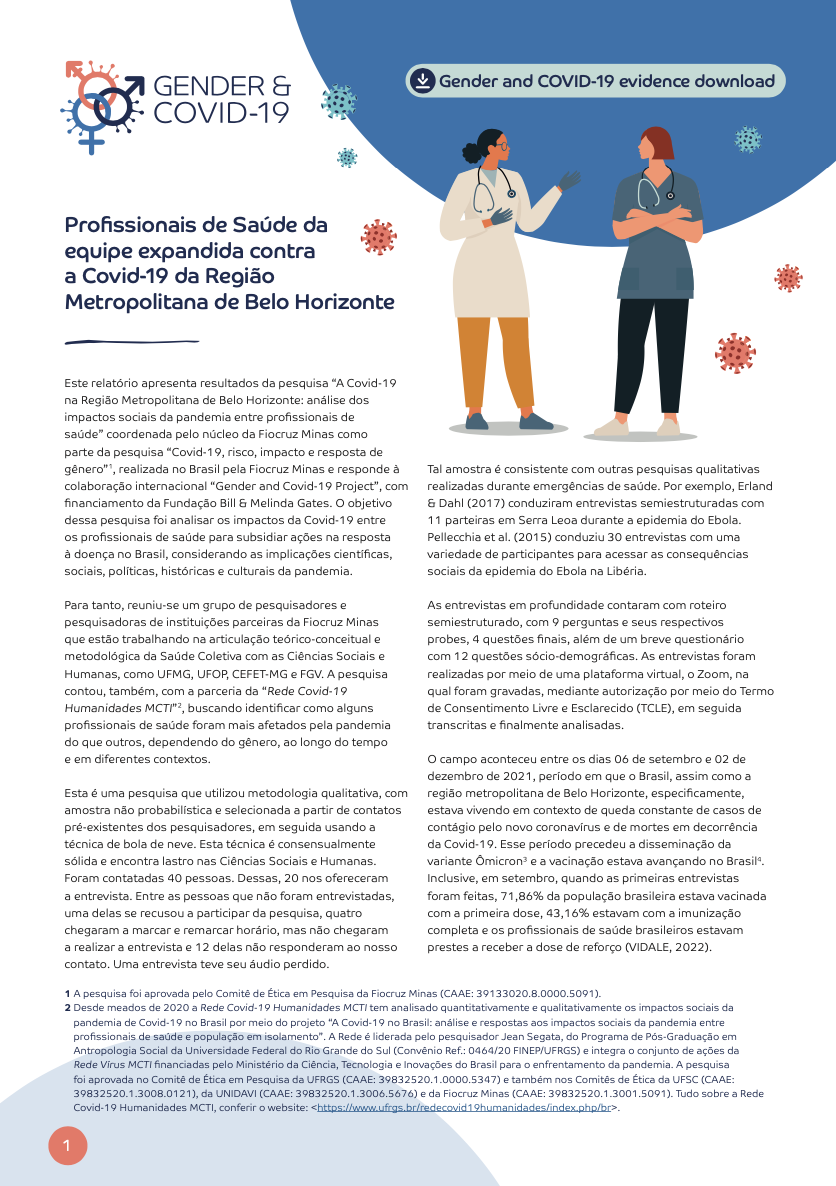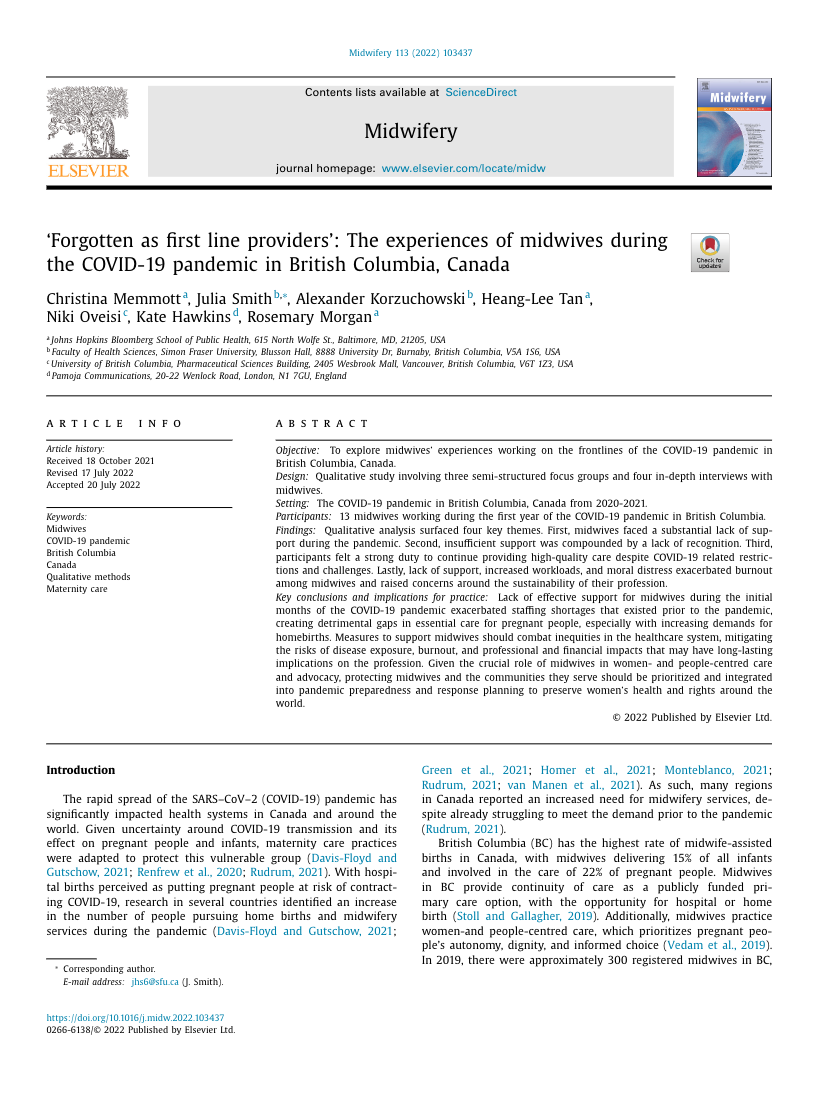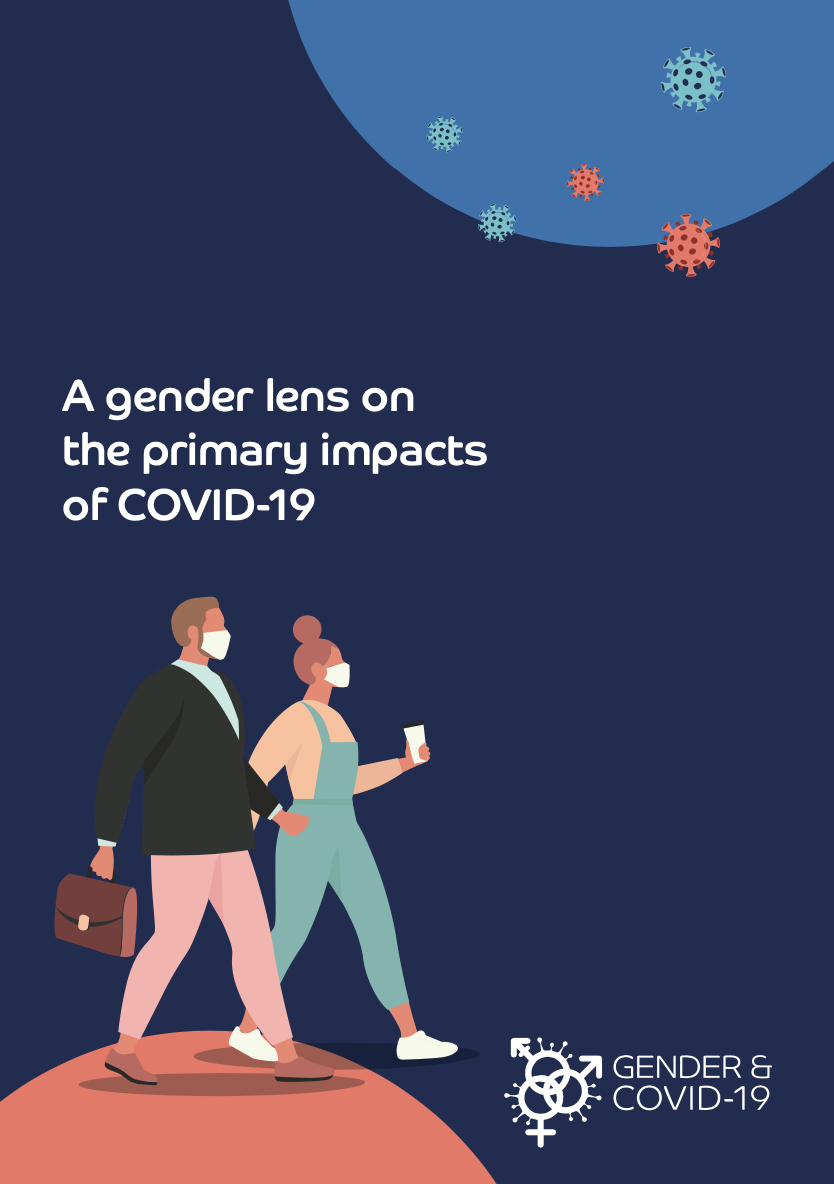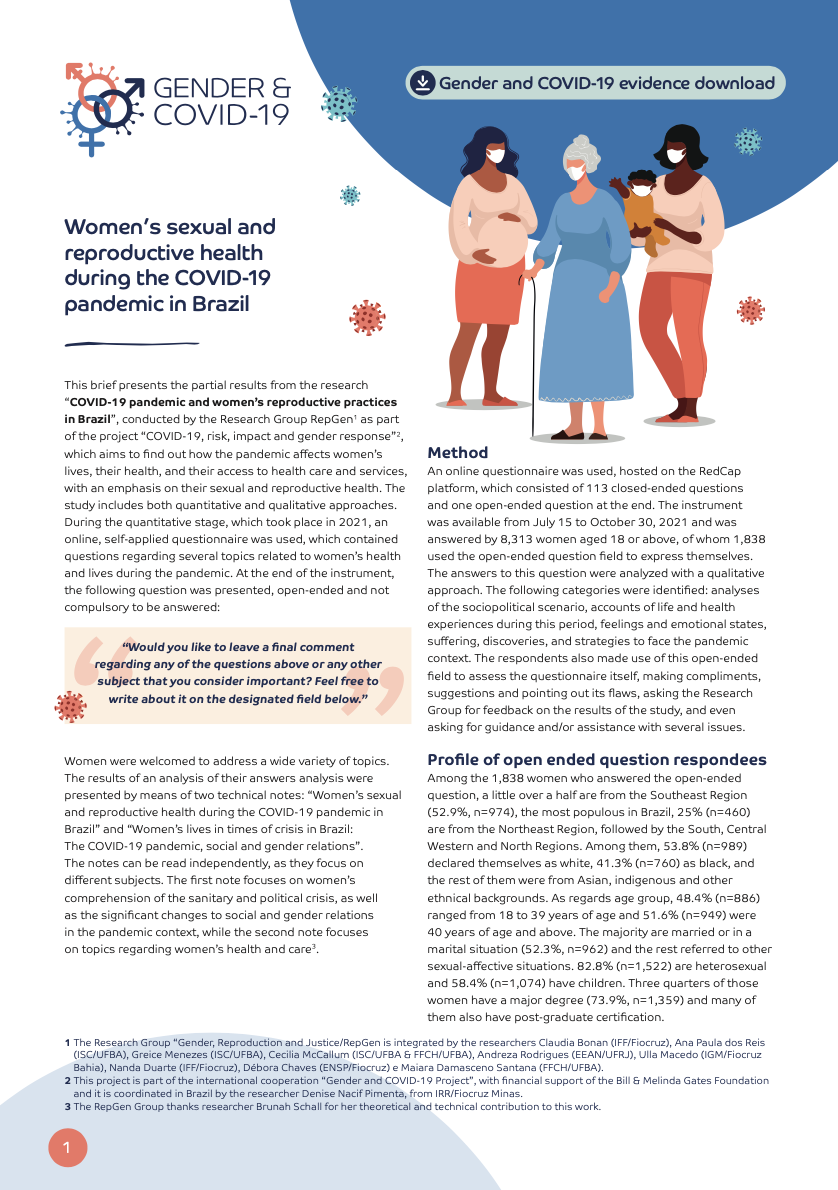Resources
![]()
This is a collection of resources from the Gender and Public Health Emergencies project and the Gender Working Group. You can search by year, country and type of resource. We hope you will enjoy reading this growing body of knowledge from around the world.
We have a wider collection of Gender and COVID-19 resources in this google document which is curated by Rosemary Morgan.
How pandemic publishing struck a blow to the visibility of women’s expertise The biases in scientific publishing during the pandemic damaged women’s visibility, recognition, and career advancement, reports Jocalyn Clark Before covid-19, Reshma Jagsi had a thriving clinical and research career. As a full time physician and deputy department chair of radiation oncology at the University […]
Abstract Background Based on a feminist approach, we analyzed the experiences of workplace bullying suffered by women front-line healthcare professionals dealing with the Covid-19 pandemic. We start from studies that show that women make up 70% of the global health workforce, 85% in the area of nursing, and 90% in the case of social care […]
Abstract The Bangladesh government issued a lockdown throughout the country from March–May 2020 in response to the COVID-19. The sudden lockdown caused economic ruptures across the country due to job loss. We conducted a comprehensive analysis of the outbreak through 40 in-depth interviews with men and women living in three Dhaka informal settlements from January […]
Abstract Random digit dial surveys with mobile phones risk under-representation of women. To address this, we compare the characteristics of women recruited directly with those of women recruited through referrals from male household members. The referral process improves representation of vulnerable groups, such as young women, the asset poor, and those living in areas with […]
The COVID-19 pandemic refocused the world to the lack of attention to gender gaps and gender-related vulnerabilities in the face of epidemics. However, while research dating back to the HIV/AIDS pandemic and earlier has documented what are the gaps and what needs to be done, there are fewer examples of tools on HOW to integrate […]
Being Cared for in the Context of Crisis: Austerity, COVID-19, and Racialized Politics This article presents an investigation into the racialized and gendered dynamics of the intensifying crisis in care for older people in the United Kingdom. Deploying a feminist political economy framework, we reveal how the care crisis is an intersectional crisis of social […]
Monkeypox vaccination for sex workers: Evidence to inform equity-based responses BACKGROUND On July 23, 2022, the World Health Organization declared the global monkeypox virus (MPXV) outbreak a public health emergency of international concern at a time when over 16,000 cases were reported in 75 countries and territories. As of August 31, 2022, the number of […]
Pandemic preparedness and COVID-19 response indicators focus on public health outcomes (such as infections, case fatalities, and vaccination rates), health system capacity, and/or the effects of the pandemic on the economy, yet this avoids more political questions regarding how responses were mobilized. Pandemic preparedness country rankings have been called into question due to their inability […]
Objective: This study aimed to investigate how COVID-19 prevention policies influenced the COVID-19 incidence in men and women. Methods: We conducted a retrospective longitudinal study using the Swiss Federal Office of Public Health and the Spanish Ministry of Health surveillance data for February 2020–June 2021 to explore sex and age differences in COVID-19 cases and testing. The […]
Abstract In addition to the direct health impacts of COVID-19, government and household mitigation measures have triggered negative indirect economic, educational, and food and health system impacts, hitting low-and middle-income countries the hardest and disproportionately affecting women and girls. We conducted a gender focused analysis on five critical and interwoven crises that have emerged because […]
ABSTRACT The gendered impacts of the COVID-19 pandemic in Australia, beyond infection and fatality rates, can be seen across a range of broader social and economic issues including care overload, domestic violence, unemployment and job loss, and housing insecurity. On the whole, government public policy in response to the effects of the COVID-19 pandemic has […]
This ready reckoner on intersectionality is primarily intended for students pursuing advanced university degrees in Public Health (e.g., Masters or PhD). The concept of intersectionality has gained immense traction in recent decades. Its popularity cuts across academic disciplines. It is also being increasingly used in policy and practice. It distils key information on the topic […]
Profissionais de Saúde da equipe expandida contra a Covid-19 da Região Metropolitana de Belo Horizonte Este relatório apresenta resultados da pesquisa “A Covid-19 na Região Metropolitana de Belo Horizonte: análise dos impactos sociais da pandemia entre profissionais de saúde” coordenada pelo núcleo da Fiocruz Minas como parte da pesquisa “Covid-19, risco, impacto e resposta de […]
Produção Legislativa e Grupos Minorizados nos dois primeiros anos da Pandemia no Brasil Esta nota técnica apresenta os primeiros resultados da pesquisa sobre a produção legislativa no período da pandemia COVID-19 diretamente relacionada a grupos minorizados (gênero, sexualidade, raça, etnia, classe, geração, dentre outros) nos anos de 2020 e 2021. A pesquisa teve a coordenação […]
Recognition of the differential effects of COVID-19 on women has led to calls for greater application of gender-based analysis within policy responses. Beyond pointing out where such policies are implemented, there is little analysis of the effects of efforts to integrate gender-based analysis into the COVID-19 response. Drawing on interviews informing a lived experienced approach […]
Este relatório apresenta resultados da pesquisa “A Covid-19 na Região Metropolitana de Belo Horizonte: análise dos impactos sociais da pandemia entre profissionais de saúde” coordenada pelo núcleo da Fiocruz Minas como parte da pesquisa “Covid-19, risco, impacto e resposta de gênero”, realizada no Brasil pela Fiocruz Minas e responde à colaboração internacional “Gender and Covid-19 […]
The objective of this research was to explore midwives’ experiences working on the frontlines of the COVID-19 pandemic in British Columbia, Canada. It is a qualitative study involving three semi-structured focus groups and four in-depth interviews with 13 midwives. The research took place during the COVID-19 pandemic in British Columbia, Canada from 2020-2021. Qualitative analysis surfaced […]
Key messages Primary impacts of pandemics include vulnerability and exposure to illness, disease incidence, duration and severity, mortality and certain prevention measures. The interaction of biological, psychosocial, and behavioral factors – including sex and gender – influence primary impacts directly and indirectly. Examining disparities in COVID-19 risk and health outcomes through an intersectional gender lens […]
Apresentamos resultados parciais da pesquisa “Pandemia de Covid-19 e práticas reprodutivas de mulheres no Brasil”, realizada pelo Grupo de Pesquisa RepGen1 como parte do projeto “Covid-19, risco, impacto e resposta de gênero”. Objetiva-se conhecer como a pandemia afeta a vida, a saúde das mulheres e o acesso aos cuidados e serviços de saúde, com ênfase […]
This brief presents the partial results from the research “COVID-19 pandemic and women’s reproductive practices in Brazil”, conducted by the Research Group RepGen1 as part of the project “COVID-19, risk, impact and gender response”, which aims to find out how the pandemic affects women’s lives, their health, and their access to health care and services, […]
Resources
![]()
This is a collection of resources from the Gender and COVID-19 project and the Gender Working Group. You can search by year, country and type of resource. We hope you will enjoy reading this growing body of knowledge from around the world.
We have a wider collection of Gender and COVID-19 resources in this google document which is curated by Rosemary Morgan.
How pandemic publishing struck a blow to the visibility of women’s expertise The biases in scientific publishing during the pandemic damaged women’s visibility, recognition, and career advancement, reports Jocalyn Clark Before covid-19, Reshma Jagsi had a thriving clinical and research career. As a full time physician and deputy department chair of radiation oncology at the University […]
Abstract Background Based on a feminist approach, we analyzed the experiences of workplace bullying suffered by women front-line healthcare professionals dealing with the Covid-19 pandemic. We start from studies that show that women make up 70% of the global health workforce, 85% in the area of nursing, and 90% in the case of social care […]
Abstract The Bangladesh government issued a lockdown throughout the country from March–May 2020 in response to the COVID-19. The sudden lockdown caused economic ruptures across the country due to job loss. We conducted a comprehensive analysis of the outbreak through 40 in-depth interviews with men and women living in three Dhaka informal settlements from January […]
Abstract Random digit dial surveys with mobile phones risk under-representation of women. To address this, we compare the characteristics of women recruited directly with those of women recruited through referrals from male household members. The referral process improves representation of vulnerable groups, such as young women, the asset poor, and those living in areas with […]
The COVID-19 pandemic refocused the world to the lack of attention to gender gaps and gender-related vulnerabilities in the face of epidemics. However, while research dating back to the HIV/AIDS pandemic and earlier has documented what are the gaps and what needs to be done, there are fewer examples of tools on HOW to integrate […]
Being Cared for in the Context of Crisis: Austerity, COVID-19, and Racialized Politics This article presents an investigation into the racialized and gendered dynamics of the intensifying crisis in care for older people in the United Kingdom. Deploying a feminist political economy framework, we reveal how the care crisis is an intersectional crisis of social […]
Monkeypox vaccination for sex workers: Evidence to inform equity-based responses BACKGROUND On July 23, 2022, the World Health Organization declared the global monkeypox virus (MPXV) outbreak a public health emergency of international concern at a time when over 16,000 cases were reported in 75 countries and territories. As of August 31, 2022, the number of […]
Pandemic preparedness and COVID-19 response indicators focus on public health outcomes (such as infections, case fatalities, and vaccination rates), health system capacity, and/or the effects of the pandemic on the economy, yet this avoids more political questions regarding how responses were mobilized. Pandemic preparedness country rankings have been called into question due to their inability […]
Objective: This study aimed to investigate how COVID-19 prevention policies influenced the COVID-19 incidence in men and women. Methods: We conducted a retrospective longitudinal study using the Swiss Federal Office of Public Health and the Spanish Ministry of Health surveillance data for February 2020–June 2021 to explore sex and age differences in COVID-19 cases and testing. The […]
Abstract In addition to the direct health impacts of COVID-19, government and household mitigation measures have triggered negative indirect economic, educational, and food and health system impacts, hitting low-and middle-income countries the hardest and disproportionately affecting women and girls. We conducted a gender focused analysis on five critical and interwoven crises that have emerged because […]
ABSTRACT The gendered impacts of the COVID-19 pandemic in Australia, beyond infection and fatality rates, can be seen across a range of broader social and economic issues including care overload, domestic violence, unemployment and job loss, and housing insecurity. On the whole, government public policy in response to the effects of the COVID-19 pandemic has […]
This ready reckoner on intersectionality is primarily intended for students pursuing advanced university degrees in Public Health (e.g., Masters or PhD). The concept of intersectionality has gained immense traction in recent decades. Its popularity cuts across academic disciplines. It is also being increasingly used in policy and practice. It distils key information on the topic […]
Profissionais de Saúde da equipe expandida contra a Covid-19 da Região Metropolitana de Belo Horizonte Este relatório apresenta resultados da pesquisa “A Covid-19 na Região Metropolitana de Belo Horizonte: análise dos impactos sociais da pandemia entre profissionais de saúde” coordenada pelo núcleo da Fiocruz Minas como parte da pesquisa “Covid-19, risco, impacto e resposta de […]
Produção Legislativa e Grupos Minorizados nos dois primeiros anos da Pandemia no Brasil Esta nota técnica apresenta os primeiros resultados da pesquisa sobre a produção legislativa no período da pandemia COVID-19 diretamente relacionada a grupos minorizados (gênero, sexualidade, raça, etnia, classe, geração, dentre outros) nos anos de 2020 e 2021. A pesquisa teve a coordenação […]
Recognition of the differential effects of COVID-19 on women has led to calls for greater application of gender-based analysis within policy responses. Beyond pointing out where such policies are implemented, there is little analysis of the effects of efforts to integrate gender-based analysis into the COVID-19 response. Drawing on interviews informing a lived experienced approach […]
Este relatório apresenta resultados da pesquisa “A Covid-19 na Região Metropolitana de Belo Horizonte: análise dos impactos sociais da pandemia entre profissionais de saúde” coordenada pelo núcleo da Fiocruz Minas como parte da pesquisa “Covid-19, risco, impacto e resposta de gênero”, realizada no Brasil pela Fiocruz Minas e responde à colaboração internacional “Gender and Covid-19 […]
The objective of this research was to explore midwives’ experiences working on the frontlines of the COVID-19 pandemic in British Columbia, Canada. It is a qualitative study involving three semi-structured focus groups and four in-depth interviews with 13 midwives. The research took place during the COVID-19 pandemic in British Columbia, Canada from 2020-2021. Qualitative analysis surfaced […]
Key messages Primary impacts of pandemics include vulnerability and exposure to illness, disease incidence, duration and severity, mortality and certain prevention measures. The interaction of biological, psychosocial, and behavioral factors – including sex and gender – influence primary impacts directly and indirectly. Examining disparities in COVID-19 risk and health outcomes through an intersectional gender lens […]
Apresentamos resultados parciais da pesquisa “Pandemia de Covid-19 e práticas reprodutivas de mulheres no Brasil”, realizada pelo Grupo de Pesquisa RepGen1 como parte do projeto “Covid-19, risco, impacto e resposta de gênero”. Objetiva-se conhecer como a pandemia afeta a vida, a saúde das mulheres e o acesso aos cuidados e serviços de saúde, com ênfase […]
This brief presents the partial results from the research “COVID-19 pandemic and women’s reproductive practices in Brazil”, conducted by the Research Group RepGen1 as part of the project “COVID-19, risk, impact and gender response”, which aims to find out how the pandemic affects women’s lives, their health, and their access to health care and services, […]

